Returning Leaders
Story by Chris Francis '13
Two IWU alumni, Amber Kujath ’97 and Bryan McCannon ’98, have returned to campus as experts in their fields leading the newly organized Schools of Nursing and Health Sciences and Business and Economics.
Illinois Wesleyan University and its alumni are always investing in the success of future students. Among the most gratifying of those investments are the ones that alumni make possible by returning to their alma mater — knowing what is special about the educational experience they received, they can carry it forward to serve new generations.
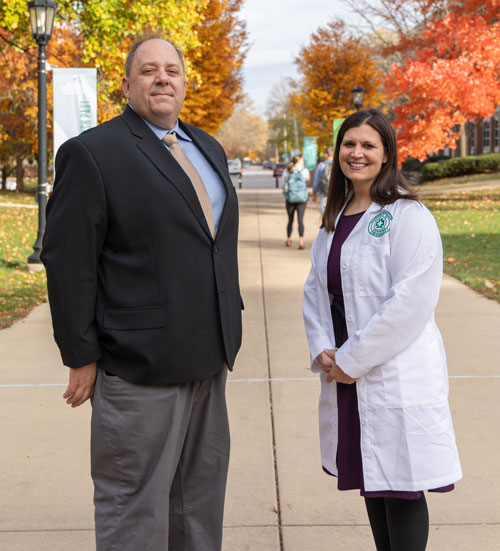
Two of the most ambitious projects IWU brought to bear in the fall of 2023 are the expanded School of Nursing and Health Sciences (SoNHS) and the newly organized School of Business and Economics (SoBE). These new investments in IWU’s growth and adaptation are being facilitated by two alumni, Amber Kujath ’97 and Bryan McCannon ’98, emerging as ideal candidates who have returned to the institution they love to help it grow with exciting new visions for its future.
“In the next five years, we want two to three new majors with our sights currently on dietetics,” Amber said of SoNHS, which will continue to incorporate health paraprofessional disciplines normally offered only at institutions that grant graduate degrees. “My goal is to have our graduates, wherever they go, be the best applicants for advanced degrees.” Emphasizing the school’s early success, Amber is quick to point out, “We just enrolled three public health majors alone in fall 2023 even though there wasn’t an opportunity to recruit for the major” during the admissions cycle.
As for SoBE, “We’re creating systematic data collection processes, including talking to big employers, so that we can really inform curriculum development,” Bryan said. Unique assets, like the 12 terminals stationed in State Farm Hall’s Greg Yess ’82 Bloomberg Finance Lab, provide options that no other business school can offer to incoming students. “Our development is going to be driven by what the market is asking for, which could include opportunities for professional adults who didn’t go to college straight out of high school.”
“Amber and Bryan’s exceptional careers and unique combination of skills will ensure that SoNHS and SoBE are both innovative and effective expansions of IWU’s academic quality and character. As alumni, they both care deeply about this institution and their disciplines, and we are excited to see what these schools will accomplish under their leadership,” said President Georgia Nugent.
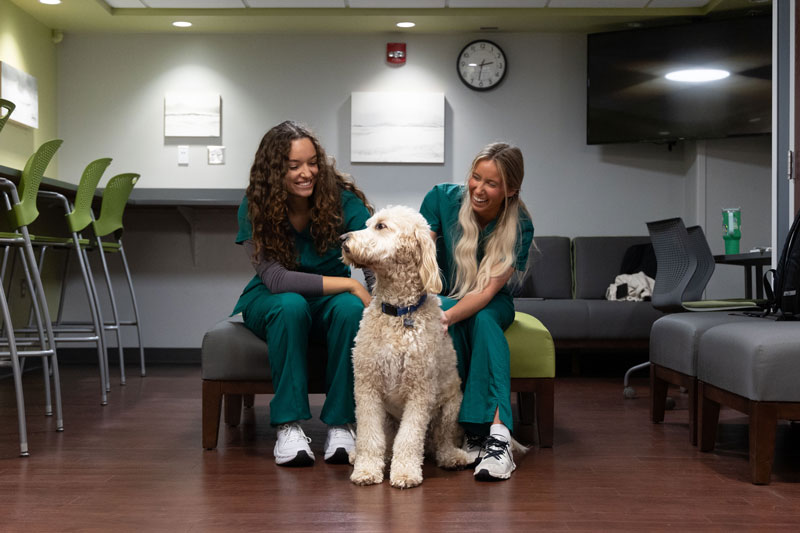
· · ·
After growing up in Plainfield, Illinois, Amber’s decision to study nursing at Illinois Wesleyan was made in the aftermath of her sister’s death when Amber was 15.
“We were still in the throes of grief,” Amber said. “I didn’t know anything about what to do because, usually, I had an older sister who did everything before me. College was the first big thing I did without a sibling, so we visited the schools that my parents wanted. IWU was close enough but not too close to home.”
Her parents, wanting to encourage her goal of becoming a nurse after her sister’s death from cancer, were personally impressed with Donna Hartweg, the director of IWU’s School of Nursing at the time. It was Hartweg who, not long after, was fielding Amber’s questions about becoming a business double- major. In other words, getting two separate degrees.
“‘Oh, you’re going to have to talk to the registrar about that,’” Amber remembers Hartweg responding a little incredulously. “I had to maximize every class I could take,” including multiple classes with conflicting schedules. Like Hermione Granger without a time-turner, she overloaded by listening to recordings of lectures late at night and taking extra quizzes on the class material.
Her idea behind the double major was to go into the field immediately after graduation with a career path in hospital administration. This plan lasted about four months after she started her first job. Seeing the pressure that hospital administration was under to cut costs, even if it meant employing too few staff members to care for too many patients, Amber realized, “I would never want to do that.”
She eventually decided to advance her career in a different direction. “I thought, who are the nurses with the coolest jobs, and who do I really admire for their career?” The answer was obvious.
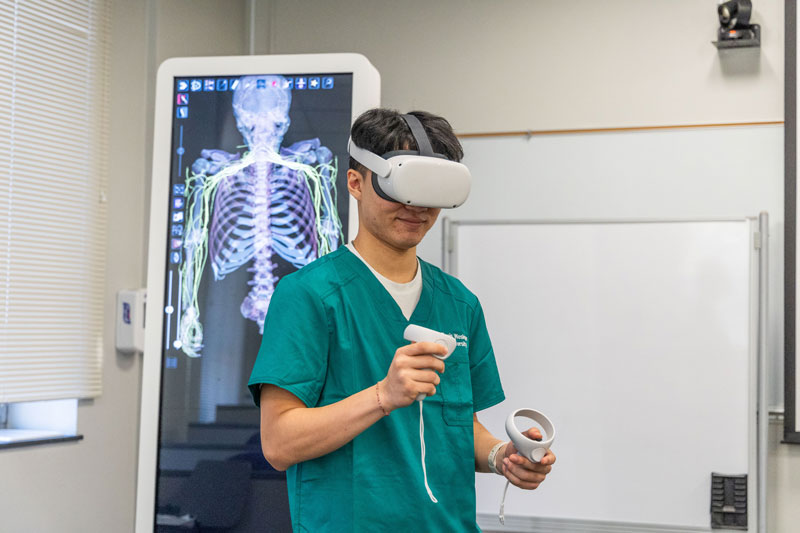
“It was by far my IWU faculty. They were incredibly smart and they cared about their students and they loved their jobs, and they still got to be in a clinical setting,” Amber said.
Amber earned her PhD in nursing from the University of Illinois at Chicago, where she researched bone health in patients with diabetes. When she was thinking about where her career would go next, she reached out to Hartweg again.
Hartweg helped her consider her options. Initially, she pursued an advanced degree with the goal to return to IWU as faculty, but Amber came to feel that it wasn't quite time. That time would come after 11 years at Rush University, when IWU asked that she return to her alma mater to lead an ambitious reimagining of the School of Nursing.
· · ·
Bryan was born in Bloomington and grew up in towns that orbited the two Central Illinois university hubs of Bloomington-Normal and Champaign-Urbana. Though his dad did not complete college himself, he was on staff at the University of Illinois, while Byan’s mother’s alma mater is Illinois State. Both were determined that Bryan go to college, and that, wherever he went, it was not a big school.
“They saw how little attention each student received, while Illinois Wesleyan was the ideal opportunity to get a really high-quality education close to home,” Bryan said.
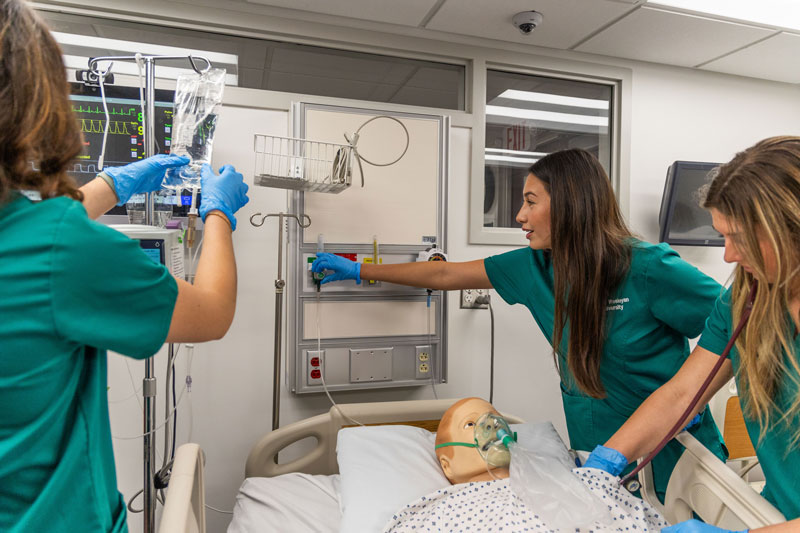
Bryan himself was trying to figure out his direction at the time. “I was just a teenager who only thought about college in terms of football teams and didn’t think about the differences between schools,” but he took his parents’ advice to attend IWU, where he was initially a chemistry major “because the smart girl in my high school class was going into pre-med, and I thought the sciences were where the smart kids went.”
Bryan quickly found that the business and economics classes on offer were much more interesting to him than chemistry labs, but, when he told his mother he was planning to change majors, surprisingly, she was worried that his new major wouldn’t make for a good career.
“She was more interested in future job prospects than I was at the time, while I was thinking about how much I was enjoying the material in the classes,” Bryan said.
Granted, what Bryan enjoyed was the academic theories and macro data analysis of economics. IWU gave him the opportunity to complete a summer-long student internship in Tokyo and work on an intensive independent research project, after which, he would spend his entire career among university faculties.
Bryan earned his PhD in economics from Pennsylvania State University, whose institutional focus on behavioral economics and game theory shaped Bryan into almost more of a political scientist, specializing in economics and law. One of his “funkiest” courses he developed — and had the most fun teaching as a professor voted “faculty of the year” in his third year at Elmira College — was about the society and economy of ancient Greece.
In 2015, Bryan was sought out by West Virginia University to help expand their own college of business and economics. While he felt invigorated by the opportunities to work with ambitious graduate students at a high quality national research institution, after eight years, he was compelled to take a leadership role in expanding business and economics at the small liberal arts university where his education in the field began.
· · ·
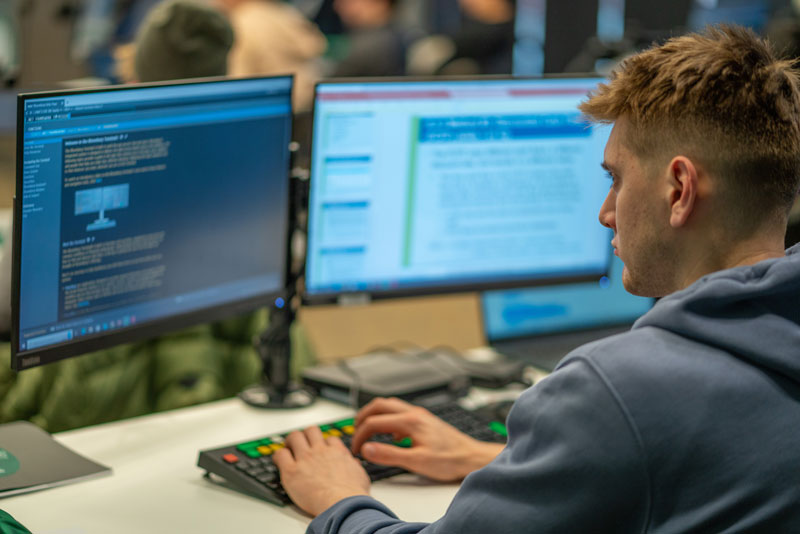
SoNHS and SoBE “exemplify our consistent goal of providing our students with the education that they need and want, both today and for tomorrow’s fast-changing world,” President S. Georgia Nugent said in a statement announcing the schools. “Each builds on the university’s existing strengths, while evolving to offer our students new opportunities for learning. These are exciting developments for IWU.”
At their heart, both are a continuation of IWU’s unique position as a university where a bedrock of liberal arts education supports a curriculum that includes pre-professional training options for students seeking those career paths.
“That’s the differentiator of an Illinois Wesleyan education,” Nugent said. “Graduates will get that entry-level job quickly, but they’re going to go further in their careers and lead richer lives because of the combination of the liberal arts and their professionally focused training.”
Amber can vouch for the value that the liberal arts at IWU added to her education as a professional who, most importantly, needs to develop relationships of trust with patients.
“One of the first patients I took care of was soon after I graduated,” which was also soon after Amber had returned from a study abroad trip that included a stop in Hong Kong. “The patient was interested in something on TV about how Hong Kong was changing back to being ruled by the Chinese government. I mentioned that I was there less than a month ago. It was a perfect conversation starter.”
For Bryan, taking his humanities studies abroad achieved a similar outcome. “I took an Asian religion class, an Asian art history class, I made sure I picked every Asian-themed course to wrap into a contract minor in Japanese studies.” When he then spent a semester living and working in Japan, his education came through a first-hand encounter with the culture and spending habits of the Japanese people at the tail end of the “Japanese economic miracle” that captured the world’s attention in the 80s and 90s.
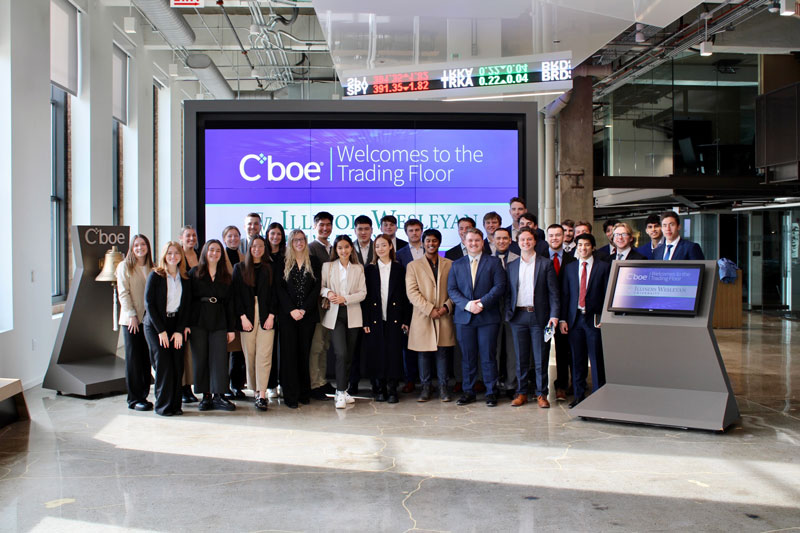
“We know from statistics that, as a liberal arts institution with opportunities like these, we’re opening doors to better long-term career success for our students,” Bryan said.
This was a revelation to Nugent while she was an administrator at Princeton, "The engineering school's advisory council made very clear that, if you can't write, you're not going to advance in engineering."
Today’s students, being hyper-focused on specific majors as the starting points for career paths, are already drawn to IWU by what SoNHS and SoBE have to offer. But the faculty at IWU know that students’ education is vastly improved by an academically diverse liberal arts environment. The goal of these schools, and the institution as a whole, will always be to give incoming students the career paths they seek with foundational skills in communication, creative problem solving, and understanding across difference that they need to thrive in their careers and lives as a whole.